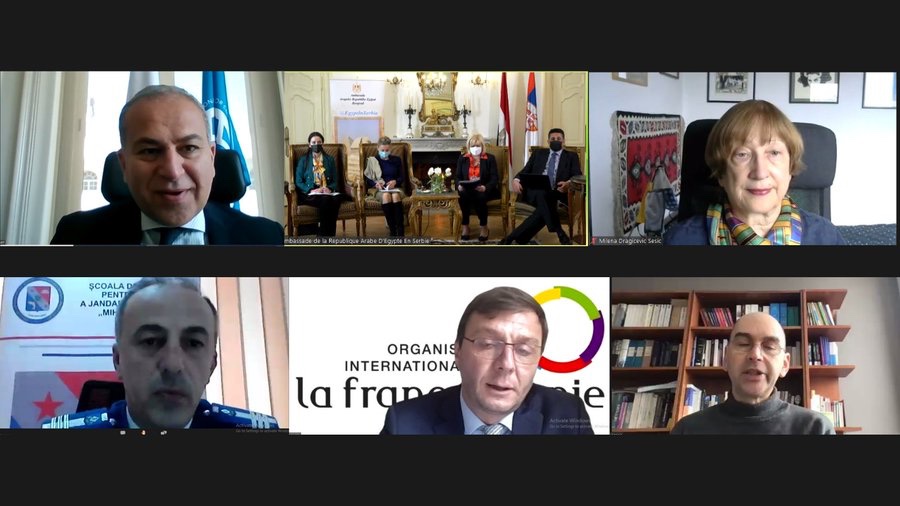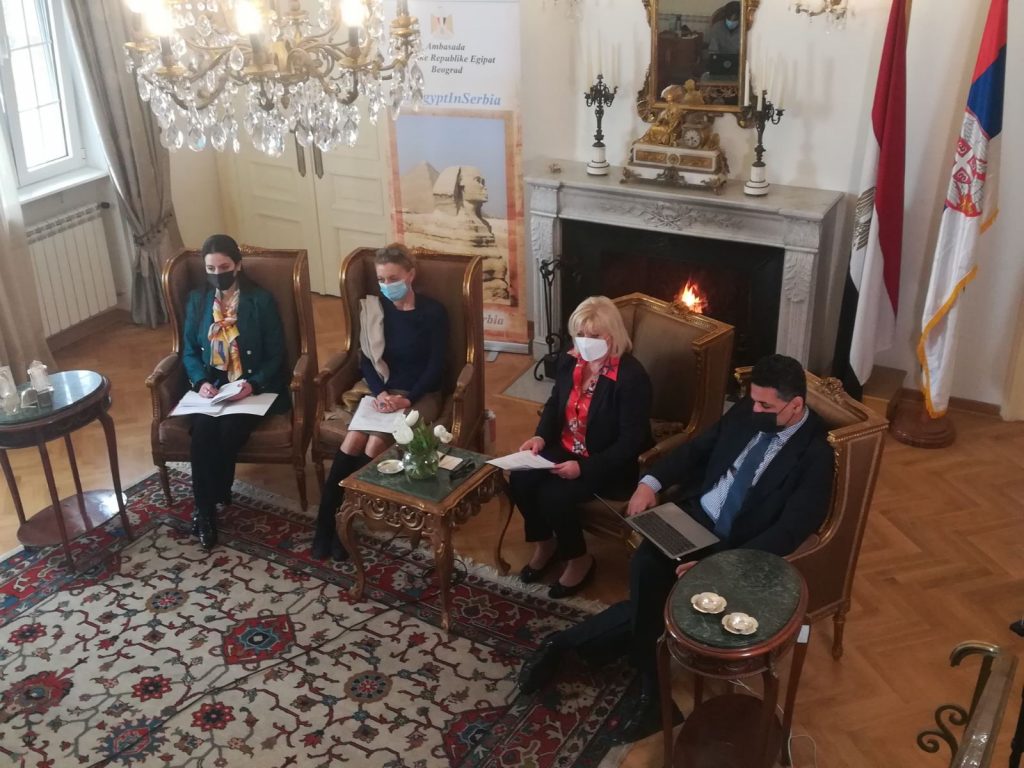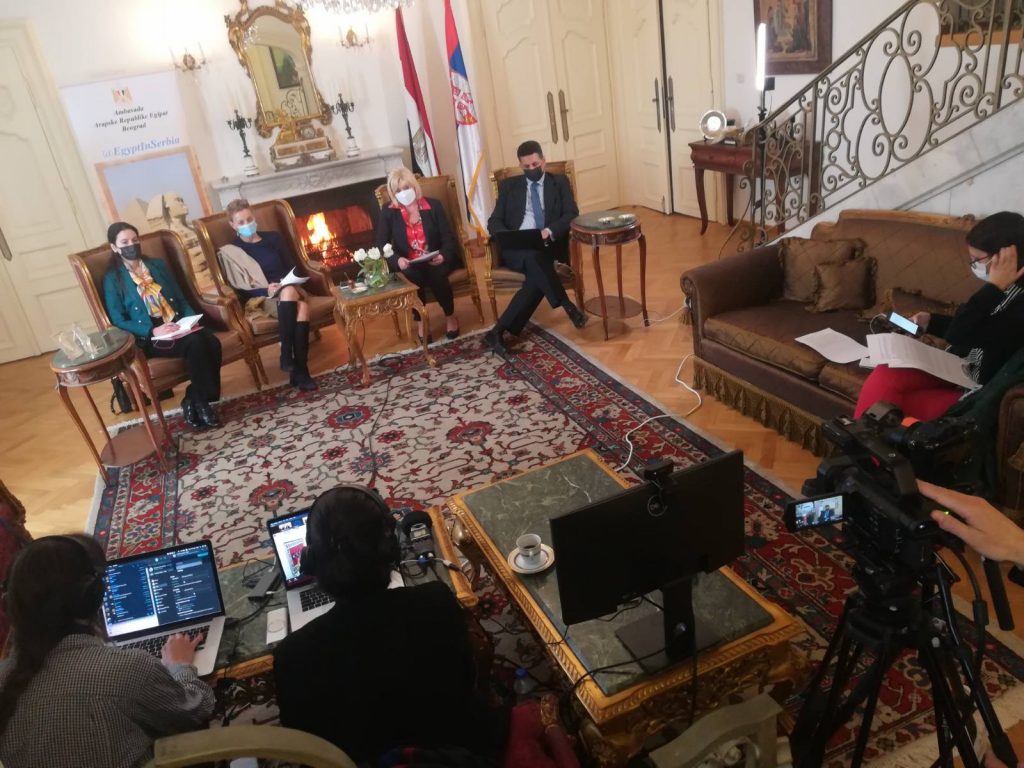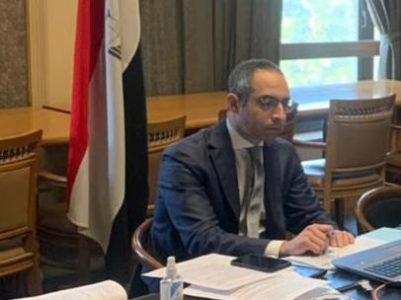Co-organized by Embassy of Egypt in Belgrade, Conflux Centre and the Cairo Center for Conflict Resolution and Peacekeeping Within the Month of Francophonie: Webinar on “Peacekeeping in the Francophone space in the 21st century” Highlights Role of Local Culture and Multilingualism

Within the Month of Francophonie, Embassy of Egypt in Belgrade, Conflux Centre and the Cairo International Center for Conflict Resolution, Peacekeeping and Peacebuilding (CCCPA) convened on March 18, 2021 a webinar titled “Peacekeeping in the Francophone space in the 21st century”, for the third year in a row. Speakers came from a diverse array of all relevant stakeholders including the Ministries of Foreign Affairs of Serbia and Egypt, the United Nations Resident Coordinator in Belgrade, the International Organization of the Francophonie, the Boutros-Ghali peacekeeping Observatory, the Gendarmerie Officers Application School of Romania, sharing their views on the current state of peace operations especially in the francophone space, reform of the United Nations peacekeeping architecture, while participants from training courses of Conflux Centre and (CCCPA) presented related case studies from the field.
Opening Remarks
President of Group of Francophone Ambassadors to Belgrade Ambassador Amr Aljowaily, who chaired the webinar, highlighted the need to integrate local culture, including multilingualism, into tools of conflict resolution, be it peacemaking, peacekeeping or peacebuilding. He reviewed the active participation of Egypt in previous initiatives related to peacekeeping in the francophone space, include the first Ministerial meeting in 2016 and the subsequent meetings of focal points for civilian capacities held by the International Organization of the Francophonie as well as activities of the Boutros Ghali observatory for peacekeeping.

Ambassador Miloš Strugar. Executive Director of Conflux Centre, co-organizer of the webinar, reviewed the most important aspect of peacekeeping missions in the highlighting that there are a number of large and complex UN peacekeeping missions deployed in the francophone space, including the stabilization mission in DR Congo and multi-dimensional missions in the Central African Republic and Mali. He added that although each conflict and each mission is unique and bears particular trademarks, a common objective is to alleviate human suffering. “To that end, close and constructive interaction between the peacekeepers and the local population built on mutual trust and understanding is essential. Peacekeeping operations need to be sensitive to local culture, employing country and regional experts, with French as the lingua franca”, he concluded.
Ambassador Ahmed Abdelatif, Director General of the Cairo International Center for Conflict Resolution, Peacekeeping and Peacebuilding emphasized the necessity of the capacity building of French-speaking countries within the framework of UN peace operations, given that approximately half of these operations are deployed in the French-speaking space and only a third of the troops in these operations are French-speaking. On the other hand, the COVID-19 pandemic creates new challenges for these operations which require increased cooperation to deal with them. “In this context, training plays a key role and the Cairo International Center for Conflict Resolution, Peacekeeping and Peacebuilding (CCCPA) wishes to increase its contribution to strengthening Francophone expertise and capacities in this field in partnership with all the actors and institutions concerned.”

The View from Belgrade
Reflecting on Serbia’s experience with Peacekeeping, Assistant Minister for Security Policy, Dijana Ivančić noted that the Republic of Serbia has significant experience in the peacekeeping process in the French-speaking countries of Africa. By participating in multinational operations in DRC (MONUSCO) for more than 8 years, in CAR (MINUSCA) for more than 7 years, as well as by previously participating in the EU operation in Mali (EUTM) (completed on 4 / 6/2020), the Republic of Serbia continuously demonstrates not only its dedication to international peace and security, but also its commitment to the principles of democracy, human rights and sustainable development, some of the key values of the Francophonie, she emphasized. The assistant minister referred to the dimension of promoting greater role of women in peacekeeping operations in French-speaking countries, as Serbia actively contributes not only to peace and security in the French-speaking region, but also to the principles of UN Security Council Resolution 1325.
United Nations Resident Coordinator in Serbia, Francoise Jacob, focused on the role of women in peacekeeping process stressing that “women are often involved as much or more than men in conflict resolution and informal peace negotiations at community, national and regional levels, noting that nonetheless they remain on the periphery of formal decision-making. She detailed that on average, women represented 13% of negotiators, 6% of mediators and 6% of signatories of major peace processes between 1992 and 2019. “When women’s participation, rights and interests are at the heart of peace and political processes, everything changes”, she emphasized concluding that “the solutions are more holistic, equitable and sustainable, and that conflicts are less likely to resurface, and peace is more durable.”
Point of view of International Organizations
Antoine MICHON, Director of Political Affairs and Democratic Governance (OIF) noted that several UN peacekeeping operations are deployed in the French-speaking world. He insisted on the need to strengthen the contribution of French-speaking, military, police and civilian personnel. The OIF carries out technical, linguistic and intercultural training actions to strengthen the skills and practice of French. This contributes to the performance of missions by facilitating the achievement of multidimensional mandates with increasing peacebuilding tasks.
Colonel Lucian Gavrilă, Head of Gendarmerie Officers Application School in Romania concentrated on the collaboration of the school with OIF and its significant mutually beneficial impact citing that support for the establishment and consolidation of peace will remain one of the main missions of the School of Application of Romanian Gendarmerie Officers, which will continue to provide specialized training to Romanian Gendarmerie personnel and internal security forces in partner countries. “For this, we will always count on the support of our partner institutions and organizations, and I mention here first of all the International Organization of the Francophonie with its Representation for Central and Eastern Europe and the French National Gendarmerie”, he added noting that “thanks to this collaboration, the International Higher Course becomes each year more effective and, most importantly, adapted to the real training needs of the security forces of each country which will provide personnel for the UN peacekeeping missions”.

Perspective of the Non-Aligned Movement
Ambassador Amr El-Sherbini, Deputy Assistant to the Minister of Foreign Affairs of Egypt for United Nations Affairs, reviewed the role of the Non-Aligned Movement in the support and development of peacekeeping UN. In this context, he detailed Egypt’s role as one of the key countries of the Movement and one of the largest contributors of troops to United Nations peacekeeping operations. He also appraised the central role of the Movement in improving the performance of peacekeeping in the operational and political dimensions, appreciating in this context the contribution of the countries of the Movement which represent 86% of the total peacekeeping forces of the UN. He also underlined the priority of political solutions as the basis of conflict response, as well as the essential contribution of peacekeeping to peacebuilding in post conflict cases.
Contribution of Academia
Dr. Michel Liégeois, associate researcher and member of the Scientific Committee of the Boutros-Ghali Observatory, Professor of International Relations at the Catholic University of Louvain emphasized that modern peace operations face complex situations, hence the ability to express oneself in the local lingua franca is essential to carry out the mandate of the peacekeepers. The latter must indeed be able to communicate easily with the political authorities, the security forces as well as with the local communities. “While many current operations are deployed in French-speaking countries, it is imperative to increase the presence of French-speaking civilian and military personnel within the missions.”
Closing Remarks
Professor emeritus Milena Dragićević Šešić emphasized the role of Conflux, whose mission is to promote international cooperation, intercultural dialogue and mediation as essential tools to meet the challenges and threats to world peace and security, as well as the role of UNESCO Chair of Interculturality, Arts Management and Mediation in the Balkan. Through their cooperation, educational and scientific projects resulted, focusing on Intercultural dialogue in conflict management and resolution through the arts. “I would especially like to underline the breadth and magnitude of the Francophonie which has given us a cultural and academic framework to develop this rich network in the diverse world, from Africa through Switzerland and Belgium, up to Canada and France.” “Seminars and trainings from Conflux and the UNESCO Chair in Belgrade try to strike a balance between the transmission of knowledge (theoretical knowledge) and the acquisition of practical mediation skills and transversal skills, necessary in today’s world.”
Concluding the webinar, Ambassador Amr Aljowaily invited the participating community of experts to contribute with ideas on furthering the role of multilingualism and local culture in efforts of conflict resolution, including peacekeeping. The partnership between the Embassy of Egypt in Belgrade, Conflux Centre and the Cairo International Center for Conflict Resolution, Peacekeeping and Peacebuilding (CCCPA) provides an excellent base is continue this dialogue and to organize events that would respond to this need. “This webinar is further proof of the active role of Egyptian diplomacy with the International Organization of the Francophonie, whose first secretary general the late Dr. Boutros Boutros Ghali contributed valuably both to the discourse on peacekeeping and to the promotion of the values of Francophonie”, he remarked.